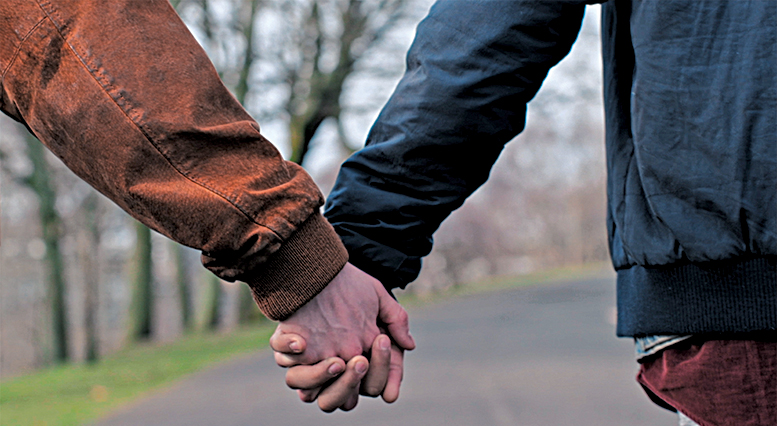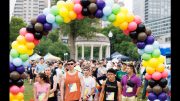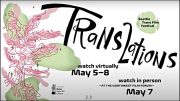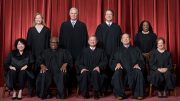Showing Affection for LGBTQ Couples Isn’t Always Safe; Boston Gay Man Organizes Time For Love Boston
By: Chris Gilmore/TRT Reporter—
“‘I’ve got nothing against gays, but do you have to do it in front of my kids?’ She ran away as soon as she had finished speaking, and I was left with a kind of rage that I knew was dangerous to keep inside,” said Scottish film director Sean Lìonadh of his first-hand account of going for a walk in the park with his boyfriend while holding his hand. Simply showing affection to his loved one and the reaction it ensued, he said, was so maddening that it inspired him to write a poem and direct a short film about it called Time For Love.
“Time For Love was about expressing that rage, and allowing a wider audience to feel the oppression that a lot of marginalised people feel every day,” Lìonadh expressed via e-mail to The Rainbow Times. “I’m lucky that my experience of homophobia has never been violent—but there was something very sinister about the aloofness of the way that woman said those words, and I wanted to challenge and explore the kind of intolerance that it’s not outright, but that simmers under the surface of modern life.”
From Scotland to the U.S., similar thoughts emerged from a Boston, Mass. gay man who had grown frustrated with his inability to hold hands publicly and freely with his boyfriend, not just within the confines of their home. And, thus, a project—inspired from the same concept as Lìonadh’s film and its name—was born.
“LGBTQ+ people still have an enormous, fundamental fear of showing affection in public,” said Nathaniel De Young, Boston’s Time For Love Project (TFLP) organizer. “This is evident in how few LGBTQ+ couples you see in any city holding hands. The fear is always there—the fear of judgment, of ridicule, of violence. I think most LGBTQ+ couples are more comfortable hiding their affection than risking any sort of attention.”
Another reason, besides conquering the fear to show his boyfriend “affection” daily, De Young felt an event like TFLP was needed to bring awareness and education to other people, whether they are pro LGBTQ+ rights or not.
“I also felt compelled to start this project because, for almost my entire life, I have felt ashamed of being gay and have never thought that I was worthy of being in a solid, healthy relationship and expressing my true feelings in public,” De Young explained.
Time For Love Project
In simple terms, if others can express their love freely when they are out in public, so should LGBTQ+ people, according to De Young.
“We want to experience what it is like to wrap our arms around our partner in the park or hold hands on the subway, or kiss at a festival without the exhausting thought process of ‘is this a safe area?’” he said.
Out of this societal conundrum, De Young started the TFLP, a unique event that will take place on October 27 at 4 p.m., which will be the first of continuous TFLP weekly events for the LGBTQ+ community in Boston. Its FB Page states its mission is to “provide LGBTQ+ couples as safe a space as possible to hold hands in public. We give strength and support by banding together as couples.”
“We will start by walking once a week in Boston Common and The Public Garden,” reads the FB event page. “As we grow in numbers and continue to make this a safe space for ourselves, we will branch out to other parts of the city, with the goal of making the entire city of Boston and beyond a safe place for all couples to walk hand-in-hand together.”
Public Affection & Depression
In his quest to find answers, De Young realized that societal rules and expectations place a larger pressure on LGBTQ+ couples who don’t feel comfortable displaying affection to one another in public spaces.
“I have come to realize that I am not the problem at all, but rather the misconceptions of the LGBTQ+ community and the shame put upon us are the problem. … But I believe if we get to the bottom of it, the real reason we justify not showing affection in public is that we believe we don’t deserve to. It is one of the ways our community believes and helps perpetuate the lie that we are lesser. We don’t realize this is a fallacy and instead internalize it, which has an extremely damaging impact on us. This helps to explain the higher rates of depression and suicide in the LGBTQ+ population than in the general population.”
In a mental health setting, expressing love and affection is synonymous with health well-being.
“Public spaces in which rules and boundaries for public affection are the same for all romantic couples, regardless of sexual orientation, [and] are ultimately the sign of a healthy societal climate in which all romantic relationships are equally welcome and affirmed” said Alex S. Keuroghlian, MD MPH, Psychiatrist and Director of the National LGBTQ+ Health Education Center, Fenway Institute, Boston.
Throughout the nation, many LGBTQ+ people still don’t know what it is to show affection to their better halves and often fear for their lives, if they were to engage in PDAs (public displays of affection).
“I, myself, have only held hands in public three or four times in my life,” said Nicholas Park, Community College Sociology Instructor, California. “I’ve experienced harassment and have anxiety over it, so I do tend to watch myself. I think the only place I have ever felt completely safe holding hands was in the Castro [District]. It has probably had some effect on my relationship—hard to see from the inside—though I know it has negatively impacted relationships of people I know.”
When the hiding becomes the survival escape and people are forced to only live their lives freely at home, other stressors ensue from within, according to Fenway’s specialist.
“Couples who do not feel safe being outwardly expressive toward one another have a psychological experience rooted in minority stress that forces them to conceal their identity for fear of discrimination and victimization,” said Dr. Keuroghlian. “This can be similar to some symptoms of posttraumatic stress disorder, including hypervigilance in public places, heightened anxiety with possible panic attacks, and low mood. There is also the internalized stigma of living as a second-class citizen in public spaces, where straight couples have the privilege of freely holding hands walking down the street without fear of being attacked.”
The basic need to kiss or embrace when saying goodbye to others, as Lìonadh writes in his poem* about homophobia (*read the poem at the end of this story), defines the moment for anyone wishing to engage in any display of affection.
“Have you ever wondered how to say goodbye? You know, to a friend’s Mum. Do you go in for a kiss on the cheek? To a colleague, neighbour. Do you hug them or shrug them off? What if that neighbour is your lover? What if there’s no other way to say goodbye than the one you know will send outcry burning through the matchstick men and women who love to strike up ideals,” reads a section of Lìonadh’s poem, a statement on the “dangers of the concept of normality.”
Public Affection & LGBTQ+ Violence
But the quest for normalcy and acceptance has often taken a turn for the worst for members of this community seeking to display small tokens of affection toward each other, as it did recently in Florida.
Earlier this year, the Advocate reported on an incident (from many that have taken place throughout the years), that happened in Miami. After a Pride parade, two gay men, Rene Chalarca and Dmitry Logunov, were holding hands while in line for a public bathroom along Ocean Drive. The couple, according to the Miami Beach police report, “accidentally bumped into Juan Carlos Lopez, and then he, with three others, began to attack them” rending one unconscious and barely making it, had it not been for the help of a bystander who was also knocked down by the four suspects. Prosecutors later, upon seeing surveillance video of the attack, upgraded the charges to hate crimes, according to the Washington Post.
From 1995-2015, “victims of sexual orientation-related hate crimes are most likely to be victimized in a public place,” according to FBI, Hate Crimes Statistics. In 2016, the nation’s law enforcement agencies reported that there were 1,218 victims of hate crimes based on sexual-orientation bias, through results from the FBI Uniform Crime Reporting (UCR) report.
Of the 1,218 victims targeted due to sexual-orientation bias, 62.7 percent were victims of crimes motivated by their offender’s anti-gay (male) violence; 21.6 percent were victims of anti-lesbian, gay, bisexual, or transgender (mixed group) bias; 11.7 percent were victims of anti-lesbian bias; and 2.2 percent were victims of anti-bisexual bias. In contrast, 1.8 percent were victims of anti-heterosexual bias.
“I think that it is rare for heterosexuals to experience harassment for showing displays of affection. On the contrary, it is often encouraged, both implicitly and explicitly,” said Parks, who’s experienced backlash when he’s shown affection to his partners throughout the years. “I was holding a boyfriend’s hand downtown. I was about 20 [years old] in this case. A couple of guys started following us and asked if we were going to get AIDS, if we wore condoms, and were just generally intimidating. In that case, I was pretty worried because it was nighttime and there were not a lot of people out. …”
Time For Love Project – Boston & Beyond
The film director, Lìonadh, whose film sparked the project at first, supports De Young’s passionate work.
“It’s a fantastic idea and I think it has the potential to blow up and really get the message of the film to any park in any country in the world,” said Lìonadh. “I hope it can be an inclusive place for everyone—every race and every kind of love. … I think this is a project for everyone. What I find ironic and idiotic about that is that if you accept someone and treat them like an equal, they are far more likely to contribute to society.”
The relatability of not being able to show affection is something that some members of the LGBTQ+ community see as an obstacle, something to work on.
“By increasing visibility, we can spread more awareness. People often do not change their minds about an issue until it affects them on a personal level,” said Parks. “It is important for people to see that they have gay friends and relatives who continue to be negatively affected by the social stigma and fear that they will be harassed or attacked.”
A sense of support and community is something the event organizer is counting on for this groundbreaking event.
“It is time to channel our fears into courage and practice showing affection in public. I think doing this will bring a brand new feeling of empowerment, belonging, and freedom that no law can provide,” said De Young. “In order for this to be effective, it really needs to be a large-scale group effort, which is why the project is so important. ”
The idea behind TFLP is to continue to have a succession of events that will help change minds, modify behaviors, open up the fears globally to what could turn into a new normal for LGBTQ+ couples, not just an exception.
“I think as we start the project on October 27 and continue every week, the gay community will slowly see that many of our fears are unfounded and, ultimately, it is safe to show affection in public. It will start with the first couples to show that it can be done,” said De Young.
“I think it would be great if we manage to reach a level of acceptance where same-sex couples holding hands in public or showing affection is not given a second thought. It still feels very much like a conscious political act rather than just normal couple behavior,” Parks said.
Find out more about the Time For Love Project Boston, and details about how many will make it to the event. View the original Time For Love film and read the full poem or read below. Check the Time For Love filmmaker on Instagram at @square__circles.
Time For Love Poem
It’s Glasgow, March and we walk hand in hand in the park.
Now it’s 15:13 and I’m late and I have to make a choice.
We’re both boys, you see.
If you were to go back and look, you’d see a hundred eyes hurry to objectify this hand in hand stance.
It’s a flurried dance of reaction. Some smile, they’re proud and they want me to know.
But there’s a darker shade of brow that balances the books.
The kind of look that challenges, like this is some chess game and I’m in check and I’m second guessing what they might do next.
Point me out to all the pawns in the crowd. Spawn a following whose glowers linger on so that our hands are no longer holding, but dragging glare after glare, snowballing stares, stretching elastic social disgrace through this forbidden space and the scales are well and truly tipped.
Now it’s 15:14, Glasgow, March, 2018 and I have to make a choice.
Have you ever wondered how to say goodbye?
You know, to a friend’s Mum. Do you go in for a kiss in the cheek?
To a colleague, neighbour. Do you hug them or shrug them off?
What if that neighbour is your lover? What if there’s no other way to say goodbye than the one you know will send outcry burning through the matchstick men and women who love to strike up ideals.
I´m a walking meal for the mouths of normality.
And what does that mean, exactly?
We´re normal, he says with his frown but under his wife’s dress and flesh is an unborn baby blessed with one more hour of air before she miscarries and they carry that grief with them to the grave and they are not normal anymore, they are changed and aching.
And that old man, I make him sick, but he writes to Japan at the weekend to get a friend to send him the used knickers you can vend from a machine there. For completely normal purposes of course.
See, normality is a crowd-sourced fantasy but it turns every single silent person in this park into an enemy.
Teenage boys blunder ahead. How much thunder are they carrying in their heads? They should probably be at school drawing straight lines. Sprinting in straight lines. Thinking in straight lines.
When the bell rings, it’s no wonder they want to straighten up anything that curves or bends.
Or her with the roll and chips and the kids. She’d take one salty glance at two guys kiss and be hissing vinegar our way. I´ve got nothing against gays, she´d say, but do you have to do it in front of my kids? And then she runs away. They never do stay long enough to look you in the eyes.
And a bible basher rehashing lies about Jesus like how Poundland rip off Mini Cheddars and sell them on as Cheese Savouries. Because it seems to me that Jesus saved a lot of time when he died for all our crimes that he would’ve wasted teaching small minds that love is no sin. See him, he thinks its faith but under all that din, it tastes like cardboard and it smells like hate.
And I may sound angry, but I’m just scared. Because in the midst of this and this and that, there’s one person I’m not looking at. Because a face looks different in the daylight than in the night where at least there’s no-one staring but you’re always wearing worry lines and looking at the time because the last train home is always waiting.
Because this should be a small choice, and there’s all this noise in my head.
I should be holding a hand and I’m holding shame instead.
But I’m letting it go. No. I won’t keep weighing it up, I’ll put my muscles at ease.
And they’re 30% of my mass by the way. I’m a homosapien.
Elbows. Knees. 60% water flooding, 7% blood rushing.
And half a percent beating heart.
So why is a goodbye kiss no walk in the park?
Half a percent doesn’t sound like much, but it’s enough.
It’s 15:15, Glasgow, March 2018 after all.
You’d think it was just about time for love.







